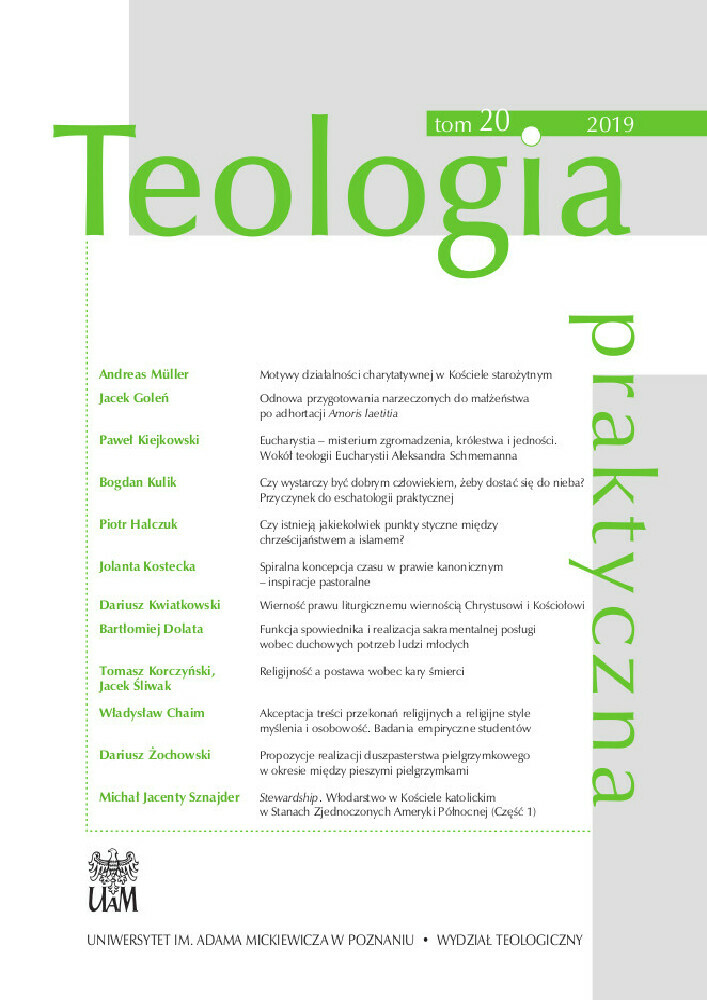Abstract
The main purpose of the analysis presented in this paper is to search for connections between religiosity and the attitude to death penalty. The paper focuses on the question: is there any connection between one’s religiosity and his (her) attitude to death penalty. The general assumption was that there is some connection between these variables. To verify the hypotheses that had been assumed, 100 respondents (55 women and 45 men) were tested by the following methods: The Scale of Relationship to God by D. Hutsebaut, the Religious Attitudes Scale by W. Prężyna, The Scale of Personal Religiousness by R. Jaworski and Scale of Attitudes to Death Penalty by Śliwak, Korczyński. The fi ndings confi rmed the main assumption that there is a connection between variables. Others hypotheses were partially confi rmed. Some diff erences were observed between the group of men and the group of women.
References
Bartula P. (1998 a): Kara śmierci – powracający dylemat. Kraków.
Bartula P. (1998 b): Podważanie abolicjonizmu w 12 punktach. W: E. Nowicka-Włodarczyk (red.), Kara śmierci s. 13-25. Kraków.
Beccaria C. (1959): O przestępstwach i karach. Warszawa.
Bronk A. (1996): Nauka wobec religii. Lublin.
Chaim W. (1991): Psychologiczna analiza religijności niespójnej. Lublin.
Chudy W. (1989): Przeciwko karze śmierci. Argumenty fi lozofi czne. „Ethos” 2 nr 5 (1) s.147-152.
De Vries B., Walker L.J. (1986): Moral reasoning and attitudes toward capital punishment. „Develop mental Psychology” 22 s. 509-513.
Donohue J.J., Wolfers J. (2006): Uses and Abuses of Empirical Evidence in the Death Penalty Debate. „Stanford Law Review” t. 58 z. 3 s. 791-841.
Grześkowiak A. (1982): Kara śmierci w polskim prawie karnym. Toruń.
Grześkowiak A. (1988): Współczesne problemy kary śmierci. „Przegląd Powszechny” 1 s. 23-37.
Harvey O.J., (1986): Belief systems and attitudes toward the death penalty and other punishment. „Journal of Personality” 54 s. 659-675.
Hutsebaut D., (1980): Belief as livd relations. „Psychologica Belgica” 20 s. 33-47.
Jarosz M. (2003): Interpersonalne uwarunkowania religijności. Lublin.
Jaworski R. (1989): Psychologiczne korelaty religijności personalnej. Lublin.
Kłoczkowski J. (2003): Akt religijny. W: Religia. Encyklopedia PWN. T. 1. Wyd. zbiorowe. Warszawa.
Krahé B. (2005): Agresja. Gdańsk.
Kuczkowski S. (1993): Psychologia religii. Kraków.
Makselon J. (1990). Psychologia dla teologów. Kraków.
McKelvie S.J., Daoussis L. (1982): Extraversion and attitude towards capital punishment. „Personality and Individual Diff erences” t. 3 z. 3 s. 341-342.
McKelvie S.J. (1983): Personality and belief in Capital Punishment: a replication and extension. „Personality and Individual Diff erences” t. 4 z. 2 s. 217-218.
Mika S. (1969): Skuteczność kar w wychowaniu. Warszawa.
Pastuszka J. (1964): Osobowość a religijność człowieka. Analiza psychologiczna. „Roczniki Filozoficzne” 12 z. 4 s. 5-16.
Prężyna W. (1981): Funkcja postawy religijnej w osobowości człowieka. Lublin.
Prężyna W. (1973): Intensywność postawy religijnej a osobowość. Lublin.
Prężyna W. (1968): Skala Postaw Religijnych. „Roczniki Filozofi czne” 4 s. 75-90.
Prokopiuk J. (1968): Szkice z psychologii religii. Warszawa.
Robbers M. (2006): Personality traits as predictors of attitudes toward the death penalty – an exploratory gendered study. „Punishment & Society” t. 8 nr 2 s. 203-222.
Ross L.T., Kaplan K.J. (1993-1994): Life ownership orientation and attitudes toward abortion, suicide, doctor-assisted suicide, and capital punishment. „Omega” 28 s. 17-13.
Szostek A. (1989): Nie będziesz zabijał (Wj 20,13). „Ethos” 2 nr 5(1) s. 137-146.
Śliwak J. (1993): Altruizm a religijność człowieka. Badanie empiryczne, „Roczniki Filozofi czne” 41 z. 4 s. 53-78.
Śliwak J. (2005): Religijne style poznawcze a postawa wobec śmierci. W: J. Makselon (red.), Człowiek wobec śmierci. Kraków.
Śliwak J., Szafrańska M. (2000): Poziom altruizmu a przeżywane relacje religijne do Boga. W: T. Doktór, K. Franczak (red.), Postawy wobec religii. Psychologiczne uwarunkowania i konsekwencje s. 161-185. Warszawa.
Śliwak J., Bartczuk R. (2011): Skala Przeżywanych Relacji Religijnych D. Hutsebauta. W: M. Jarosz (red.), Psychologiczny pomiar religijności s. 171-200. Lublin.
Śliwak J., Zarzycka B., Rak R. (2011): Kryzys w wartościowaniu a relacje religijne. „Czasopismo Psychologiczne” 17,1 s. 75-86.
Valliant P.M., Oliver C.L. (1997): Attitudes toward capital punishment: a function of leadership style, gender and personality. „Social Behavior and Personality” 25 s. 161-168.
Wandrasz M. (1998): Religijność a postawa wobec choroby. Lublin.
Watson P.J., Ross D.F., Morris R.J. (2003): Borderline personality traits correlate with Death Penalty decision. „Personality and Individual Diff erences” t. 35 z. 3 s. 421-429.
License
Autorzy
Autorzy tekstów przyjętych do publikacji w czasopiśmie Teologia Praktyczna są zobowiązani do wypełnienia, podpisania i odesłania na adres redakcji umowy o udzielenie nieodpłatnej licencji do utworów, z zobowiązaniem do udzielania sublicencji CC.
Zgodnie z umową, autorzy tekstów opublikowanych w czasopiśmie Teologia Praktyczna udzielają Uniwersytetowi im. Adama Mickiewicza w Poznaniu niewyłącznej i nieodpłatnej licencji oraz zezwalą na użycie sublicencji Creative Commons Attribution-NoDerivatives 4.0 International (CC BY-ND 4.0).
Autorzy zachowują prawa do dalszego, swobodnego rozporządzania utworem.
Użytkownicy
Zainteresowani użytkownicy internetu uprawnieni są do korzystania z utworów opublikowanych od 2015 roku w Teologii Praktycznej pod następującymi warunkami:
- uznanie autorstwa - obowiązek podania wraz z rozpowszechnionym utworem, informacji, o autorstwie, tytule, źródle (odnośniki do oryginalnego utworu, DOI) oraz samej licencji;
- bez tworzenia utworów zależnych - utwór musi być zachowany w oryginalnej postaci, nie można bez zgody twórcy rozpowszechniać np. tłumaczeń, opracowań.
Do wszystkich tekstów opublikowanych przed 2015 r. prawa autorskie są zastrzeżone.
Inne
Uniwersytet im. Adama Mickiewicza w Poznaniu zachowuje prawo do czasopisma jako całości (układ, forma graficzna, tytuł, projekt okładki, logo itp.).

